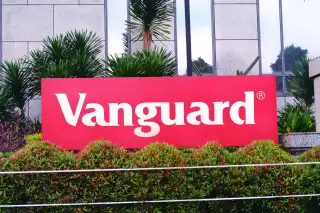Vanguard Slashes Investing Costs With 'Largest Fee Cut' in Company History

Brokerage giant Vanguard announced on Monday that it is slashing expense-ratio fees on dozens of its funds, a move the company said will save investors $350 million this year. In a news release, Vanguard said it was dropping these fees on 87 mutual funds and exchange-traded funds (ETFs), an action the company called "the largest fee cut in Vanguard history."
Even before this announcement, Vanguard had lower average expense fees than its peers, the annual US Fund Fee Study from Morningstar found. In 2023, Vanguard had an average 0.08% fee. With the new announcement, its asset-weighted average fee has dropped to just 0.07%, versus 0.44% across the industry, according to Bloomberg.
The push to lower expense ratios is a continuation of a long trend that makes investing cheaper for the average American. Morningstar noted that expense ratios have lowered considerably over the last two decades, industrywide: It found that the asset-weighted average fee fell from 0.87% in 2004 and to 0.36% in 2023, and it calculated that lower investing fees saved investors a total of $6 billion in 2019 alone.
The fees go toward covering the costs of administering, managing and other services. Although investors might not notice expense-ratio fees because they’re deducted from a fund’s total value, they can add up over time and weigh on returns. Funds that aren't actively managed have considerably lower expense ratios because they don't have to spend money on portfolio managers to research and select trades. (As it turns out, they often perform better, particularly over an extended period of time.)
Will other firms also cut fees?
If history is any guide, Vanguard’s announcement could put pressure on its competitors to follow suit. The economics of online brokerages underwent a major shift in 2019 when online stock-trading platform Interactive Brokers rolled out IBKR Lite, which took the then-radical step of eliminating commissions on all trades of U.S.-listed stocks and ETFs. The action triggered a price war among big brokerage firms like E-Trade, Schwab, TD Ameritrade and Fidelity. All followed suit, announcing in subsequent months that they also would cut trading commission fees on common investment instruments to zero. (Vanguard joined them in early 2020.)
Some market observers put the start of the shift further back, pinpointing trading app Robinhood’s 2013 debut. The start-up gained notoriety by offering free trades at a time when typical commissions ranged between $7 and $10. At those prices, institutional investors could make money trading, but average Joes and Janes would have to get lucky — repeatedly — just to keep breaking even on their trades, never mind turn a profit.
Robinhood's success proved that, even after eliminating fees on trades for domestic stocks and ETFs, online brokers still could make money. They did this, in part, by retaining trading commissions for most mutual funds as well as more complex trading instruments like futures and options (although a number of brokerages now offer free options trading, as well). As the barrier to trading lowered, many platforms also added higher tiers or products offering educational insight and advice for novice investors.
Lower investing costs are democratizing investing more broadly. The Federal Reserve found that the number of families who directly own stock has jumped even more since then, rising from 15% in 2019 to 21% in 2022 — the largest change on record, according to the central bank.
More from Money:
Do 401(k)s Have Fees? 40% of Account Holders Have No Idea
5 Best Stock Trading Apps of 2024
Finance Giants Say 2024 Will Favor Active Investing Over Safer Passive Approaches